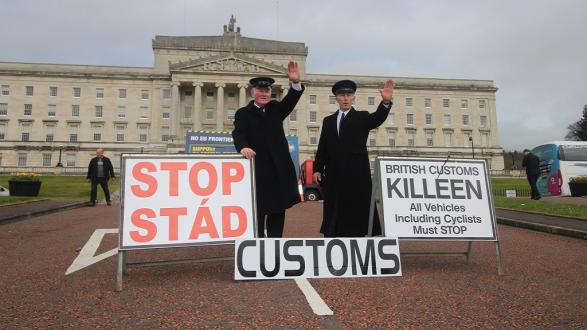In:
Global Beat is your weekly stop for news from around the world. Join us every Friday morning for important stories you should know about.
This week, the British government says it intends to avoid a hard border between the Republic of Ireland and Northern Ireland after Brexit; the United States, Mexico, and Canada open negotiations to reform NAFTA; the Taliban tells President Trump to withdraw U.S. troops from Afghanistan; and more.
____________________
Americas
The United States, Mexico, and Canada opened negotiations Wednesday to reform the North American Free Trade Agreement (NAFTA). At the outset, U.S. Trade Representative Robert Lighthizer demanded an overhaul that would cut U.S. trade deficits and increase the use of regional parts for autos produced in North America. Lighthizer went on to say that the Trump administration believes that NAFTA has "fundamentally failed" Americans and is in need of "major improvements." Representatives from Canada and Mexico said the current agreement is not tilted against the United States. The talks this week are the first of several scheduled rounds between now and the end of the year, when the three nations hope to conclude a deal.
Also check out:
Central & South Asia
In an open letter sent to President Trump, the Taliban called for the U.S. military to leave Afghanistan rather than increase the number of troops in the war-torn country, as the administration is considering doing. The 1,600-word letter sent by Taliban spokesman Zabiullah Mujahid also said a U.S. withdrawal would "truly deliver American troops from harm’s way" and bring about "an end to an inherited war." The letter comes after U.S. Defense Secretary James Mattis said on August 14 that the Trump administration was very close to announcing its new military strategy for Afghanistan. In recent months the Taliban have been steadily extending their reach in Afghanistan. They are now believed to control at least 10 percent of the country and contest another third. Al Qaeda and ISIL are also both active in the country.
Also check out:
- Indian and Chinese troops clash in disputed Himalayan border region – Agence France-Presse
China & East Asia
North Korean state media announced this week that Kim Jong-un has reviewed plans to fire missiles at U.S. territory Guam and decided to postpone those plans. Kim said he will continue to watch what the "foolish Yankees" do before taking action. The announcement followed a week of escalating rhetoric between Kim and President Trump. South Korean President Moon Jae-in said the United States has agreed not to take any military action against North Korea without approval from South Korea.
Also check out:
- Satellite photos suggest there might be more to China’s new military base in Djibouti than Beijing is letting on – Salem Solomon and Liyuan Lu, Voice of America
Europe & Russia
The British government released a paper this week detailing its intention to avoid a hard border between the Republic of Ireland and Northern Ireland once the United Kingdom leaves the European Union. The only land border between the UK and EU has been a source of major concern since last year’s Brexit referendum, sparking fears that a return to passport checks, customs checks, and armed guard posts—which were a mainstay of the violent era of the Troubles—would undo a hard-won peace process known as the Good Friday Agreement. The British government’s paper states that there will be no physical infrastructure, cameras, or license plate recognition technology along the border. Critics say the British government’s proposals are unrealistic and undetailed. The European Commission responded to the paper by saying there must first be assurances that the Good Friday Agreement will be protected.
Also check out:
- Van drives into crowd in Barcelona’s popular Las Ramblas district, killing 13 and injuring more than 50 in terrorist attack – William Booth, Karla Adam, and Brian Murphy, Washington Post
Middle East & North Africa
Iranian President Hassan Rouhani threatened to withdraw from the Iran nuclear deal "within hours" if the United States continues to impose sanctions on Iran. Rouhani, who was a key architect of the deal in 2015, said the United States is an unreliable partner. In July, the Trump administration recertified that Iran was complying with the terms of the deal, but President Trump recently said Iran is in violation and assembled a team of White House aides to make that case.
Also check out:
- Turkey warns Iraqi Kurdish referendum can lead to "civil war" – Associated Press
Southeast Asia & Oceania
Philippine police killed 32 people on Monday in the deadliest day of President Rodrigo Duterte’s brutal war on drugs. Human rights groups have decried the campaign—which has left thousands dead, many of whom are drug users and not dealers—as consisting of crimes against humanity. Meanwhile, Indonesian police have killed 60 people suspected of dealing drugs so far this year, compared to just 18 in all of 2016. Amnesty International warned that Indonesia may be looking to imitate Duterte’s war on drugs.
Also check out:
- Australia’s highest court rules that sending refugees to detention camps in Papua New Guinea is legal – Kristen Gelineau, Associated Press
Sub-Saharan Africa
Kenyan opposition leader Raila Odinga will challenge the results of last week’s presidential election, in which incumbent President Uhuru Kenyatta won reelection. Odinga's decision to go to the country’s Supreme Court instead of calling for more demonstrations is expected to ease concerns about further violence after 25 people—including a six-month-old baby—were killed since the election on August 8. Odinga said he does not wish to overturn the outcome of the election but rather expose evidence that the vote was rigged.
Also check out:
- Grace Mugabe, wife of Zimbabwean President Robert Mugabe, seeks diplomatic immunity in South African assault case – Ed Cropley, Reuters




